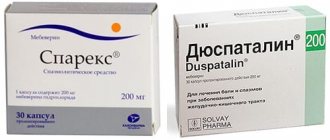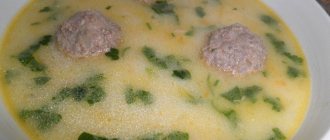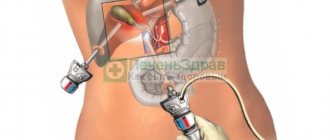Trimedat is a drug that regulates the intensity of motor activity of the digestive tract (mainly the intestines) and, accordingly, the speed of movement of the food bolus from the esophagus to the colon. Trimedat is used to relieve various symptoms caused by disorders of gastrointestinal motility, such as diarrhea or constipation, flatulence, intestinal colic, abdominal pain, cramps, nausea and vomiting.
Trimedat - what is it and what is it for?
Trimedat tablets represent a pharmacological group of drugs that affect intestinal motility and tone. They are used for various pathologies of the digestive system, accompanied by changes in the tone of the intestinal walls.
What is it prescribed for? Taking Trimedat tablets is indicated for certain pathological conditions that are accompanied by a change (increase or decrease) in the tone of the smooth muscles of the walls of the hollow structures of the digestive tract:
- Functional changes in the gastrointestinal tract, accompanied by intestinal movement disorders (gastroesophageal reflux disease, irritable bowel syndrome, dyspeptic disorders).
- Impaired motor activity of the hollow structures of the gastrointestinal tract after surgery (postoperative paralytic ileus).
- Preparing the patient for x-ray or endoscopic examination of the intestine.
The drug is also used for functional changes in intestinal motility in children.
| Latin name | Trimedat |
| ATX code | A03AA05 |
| Active substance | Trimebutine |
| Manufacturer | VALENTA PHARMACEUTIKA, Russia |
| Price | 262 rub. |
Some facts
Irritable bowel syndrome is a disease associated with changes in the functioning of the intestines. It is accompanied by discomfort and pain, bloating, and disturbances in normal functioning. At the same time, organic causes of this condition are excluded.
After contacting a specialist, the patient undergoes histological tests. The picture is more similar to dystrophy than to the presence of inflammation.
Irritable bowel syndrome is classified as one of the most common ailments in the world. About 20% of the world's population suffers from this disease. Mostly patients are women. The disease often affects people in the age group of 30 to 40 years. Statistical studies show that due to the “frivolity” of symptoms, people do not seek medical help and self-medicate.
Modern doctors and researchers claim that the main cause of the development of the disease is stress. Often symptoms intensify during periods of emotional turmoil or after eating specific foods (spicy, sweet and other food groups). In addition, the cause of the development of the disease can be improper development of microflora, poor nutrition, unhealthy lifestyle, and consumption of foods that stimulate bloating.
There is information that peaks of unwanted symptoms occur during periods of increased hormone levels. For example, in women the syndrome often worsens during menstruation.
Trimedat is a remedy that is prescribed not only for this syndrome, but also for a number of other digestive disorders.
pharmachologic effect
Myotropic antispasmodic that regulates the motility of the digestive system. The active substance affects the enkephalinergic system of the intestine and regulates peristalsis. Trimebutine has an antispasmodic effect in hyperkinesis of smooth muscle tissue of the digestive tract, and in hypokinetic conditions it stimulates intestinal function.
The drug enhances peristalsis and promotes gastric emptying, reduces pressure on the esophageal sphincter, acts throughout the intestine, enhances the response of the smooth muscle tissue of the large intestine to various food irritants. For diseases of the digestive tract associated with impaired motility, trimebutine helps restore the physiological activity of the intestine.
What does Trimedat help with? Indications for use
Most often, Trimedat tablets are used for various dyspeptic symptoms that accompany diseases of many parts of the gastrointestinal tract. These signs include:
- bloating;
- painful spasms and colic;
- increased gas formation;
- constipation and diarrhea;
- heaviness in the stomach and abdomen;
- heartburn;
- burping;
- vomiting;
- nausea;
- distension.
Often, such signs are characteristic not of organic damage to the gastrointestinal tract, but of functional disorders. In children, they can be triggered by past infections, connective tissue dysplasia, diseases of the autonomic nervous system, and neuroses. In adults, the drug effectively relieves symptoms that arise due to stress, poor diet, and bad habits.
Trimedat is indicated for all forms of irritable bowel syndrome. With the help of this drug, intestinal obstruction due to postoperative paralysis is treated.
In complex therapy, tablets are indicated in the treatment of GERD (gastroesophageal reflux disease) and esophagitis. The tablets also help prepare for intestinal examinations - irrigoscopy, colonoscopy.
Contraindications ⛔
The product has extensive indications, but it has few contraindications. You should not take the tablets if you are intolerant (hypersensitivity) to the active substance or other ingredients. Other prohibitions on treatment include:
- first trimester of pregnancy (up to 13 weeks inclusive);
- glucose-galactose malabsorption syndrome;
- lactose intolerance.
In pediatrics, the drug is widely used. It is allowed to drink it from the age of 3, mainly for GERD or functional dyspepsia. It is prohibited to exceed the age-appropriate dosage or use the medicine without a doctor's prescription.
There have been no cases of overdose, but the prescribed dose should not be exceeded.
Side effects are rare, and the medicine is usually well tolerated by patients of any age. Still, for some it can provoke the following symptoms:
- diarrhea;
- constipation;
- skin rash;
- urine retention;
- menstrual irregularities;
- drowsiness;
- thirst, dry mouth;
- anxiety.
In very rare cases, long-term use of the medication can cause pain and enlargement of the mammary glands. This requires urgent cancellation of treatment with Trimedat. Among isolated cases of side effects, disturbances in auditory perception of a reversible nature have also been described.
Analogs
Analogues of the drug are classified by their similarity to the active components and the provision of the required therapeutic effect. Based on the main substance, trimebutine maleate is isolated. Based on their medicinal effect, the following drugs are distinguished:
- Irmalax (enriched with vitamin C);
- Bactistatin;
- Halidor;
- Spasmonet;
- Mucofalk;
- No-shpa or Drotaverine;
- Spakovin.
In childhood, it is very important to use the original drug and not its analogue. It is unacceptable to switch from taking one drug to another on your own, even if it is much cheaper. For all questions about alternative therapy, you should contact a gastroenterologist.
Instructions for use of Trimedat tablets
Trimedat tablets should be swallowed whole and washed down with plenty of water. For adults and children over twelve years of age, Trimedat is prescribed orally at a dose of 100-200 mg three times a day. To prevent relapse of irritable bowel syndrome after a course of therapy, during the period of remission, you should continue taking the medication at a therapeutic dose of 300 mg per day for twelve weeks.
Children aged five to twelve years are prescribed 50 mg of the drug three times a day, children aged three to five years - 25 mg of the drug three times a day.
According to the instructions, the use of Trimedat in the form of a suspension is prescribed according to the following scheme:
- children under six months of age - half a teaspoon two to three times a day;
- children from six months to one year - one teaspoon twice a day;
- from one to five years – one teaspoon three times a day;
- children over five years old - two teaspoons three times a day;
- adults – two tablespoons three times a day.
How to take Trimedat: before or after meals?
The medicine must be used correctly. The speed of action of the drug depends on food. If the remedy is taken before meals, it acts much faster. Taking the medication with food greatly reduces its effectiveness.










